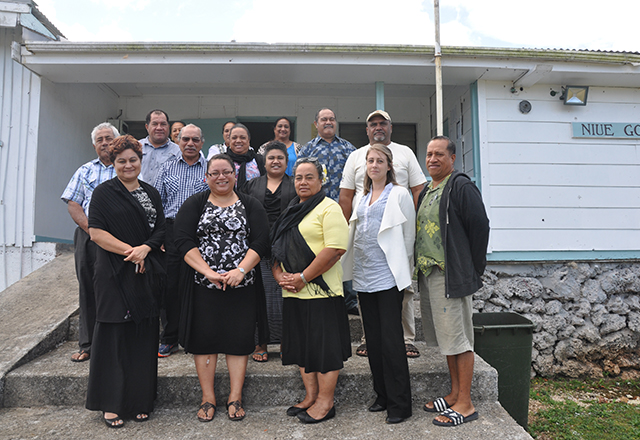
7 August, 2015 - In Niue today, a new initiative was launched to promote effective waste management and composting. Through the innovative new demonstration project, it is hoped that communities in Niue will take up composting as an alternative to the common practice of burning green waste.
The initiative is supported through a partnership between the Pacific POPs Release Reduction project, managed by the Secretariat of the Pacific Regional Environment Programme (SPREP), and Pacific Organic and Ethical Trade Community (POETCom), which is housed at the Secretariat of the Pacific Community (SPC).
The demonstration project, which will run over a period of three years, will engage families in the six villages of Alofi, Vaeia, Tamakautoga, Avatele, Hakupu and Liku located on the southern, more densely populated, side of Niue.

The project focuses on sharing composting knowledge, and encouraging communities to separate their waste and convert it into useful resources. As a result, it will contribute to the greater protection of the environment and the reduction of Persistent Organic Pollutants, known as POPs.
Ms Lusiana Ralogaivau, SPREP's GEF POPs Project Coordinator, explains:
"POPs are toxic chemicals that can travel long distances through air and water, and accumulate in the fatty tissues of humans and other animals. Over time, these POPs can cause serious health issues including cancer, birth defects and immune system impairments. However, many people don't realise that the open burning of household rubbish, including green waste, causes these POPs to be released into the air."
As well as reducing the release of POPs, the project will contribute to the sustainability of food sources for the people of Niue, who rely heavily on agriculture for food security and income. The compost generated through the project will be used to create natural fertilisers that are clean, safe, and beneficial for the soil and for the environment.
POETCom's role in the demonstration project is to provide specialist training for quality compost productions as well as guidance materials, awareness and advocacy. POETCom coordinator, Ms Karen Mapusua, explains that the partnership between SPREP and SPC will help islanders protect the health of their soil:
"If you dig up a handful of soil in the forest floor it will be moist, rich, and full of organic matter and worms and insects. Composting is a key way for farmers to copy the cycles in nature, for it returns plant nutrients to the soil in the most effective way to fertilise other plants. If we burn our gardens and kitchen waste we lose all those nutrients."
Ms Mapusua continues:
"We are used to burning the waste or having it collected and taken away – and the hardest part of composting is usually changing our own behaviours so it becomes part of our household routine."
POETCom will work closely with Niue's Ministry of Natural Resources in implementing the project.
The Pacific POPs Release Reduction project is co-funded through the Global Environment Facility - Pacific Alliance for Sustainability (GEF-PAS) and Agence Française de Développement (AFD). It is executed by SPREP, in close cooperation with the United Nations Environment Programme (UNEP) and the Food and Agriculture Organization (FAO).